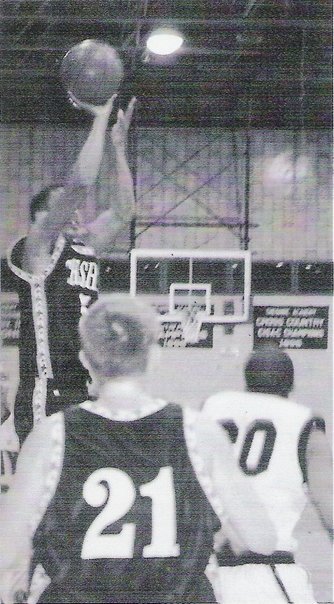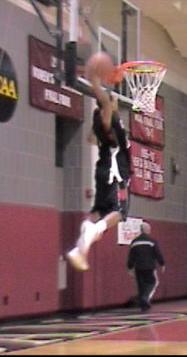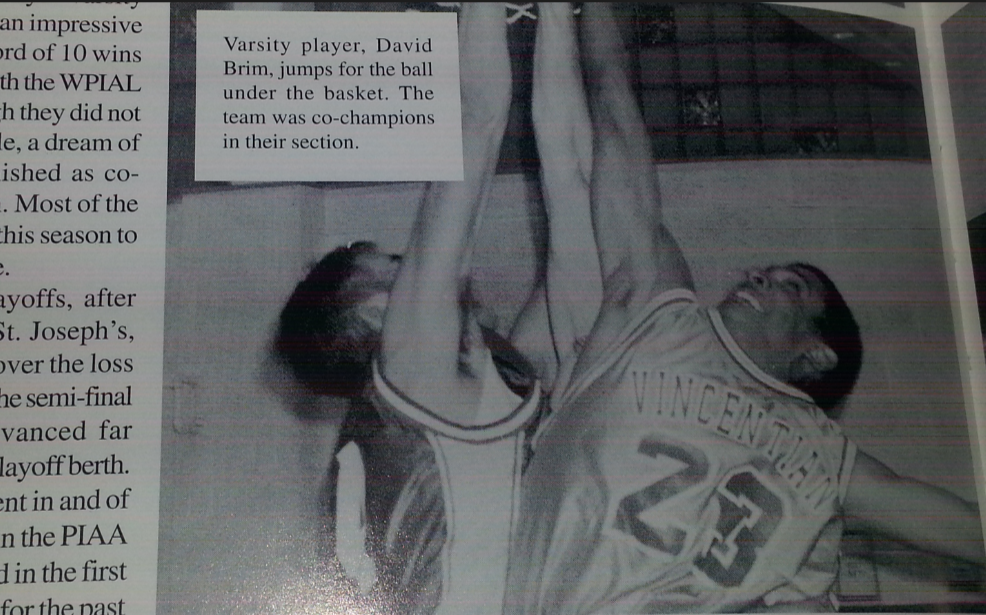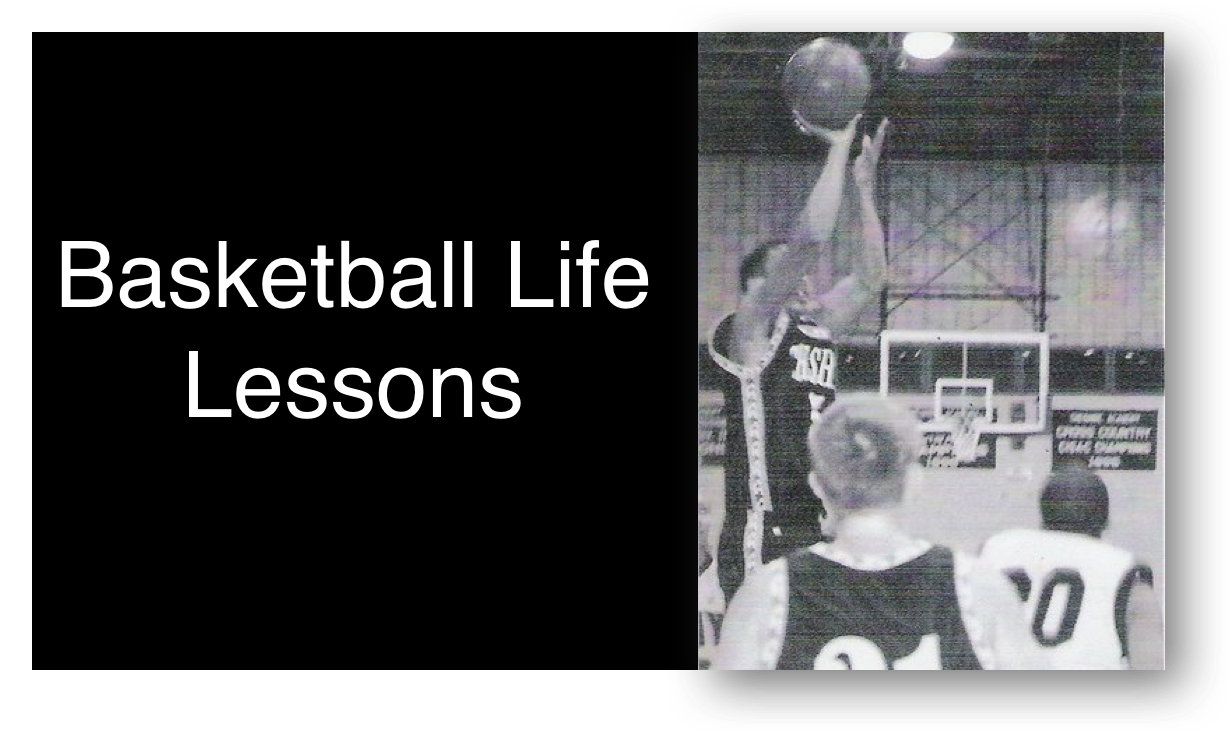33 valuable life lessons I learned from basketball
With the NCAA basketball tournament winding down I couldn’t help but think how many seniors played their final college basketball game. I know how it feels. Though several athletes will be fortunate enough to make it to the next level, most will not. My basketball journey was full of excitement and disappointment. Fun and frustration. Hope and despair. Looking back on my journey I would not trade it for anything. It has made me who I am and there were many lessons I learned along the way that I carry with me today.
I took some time to reflect and organize these lessons and thought I’d share them with you. Here are 33 lessons that I learned from my time on the hardwood…
1. You miss 100% of the shots you don’t take
Don’t let the fear of not succeeding stop you from pursuing the opportunity in the first place. As you learn to act despite fear, or act in pressure situations when others would freeze you step out of your comfort zone and can raise to new heights.

2. A clear vision and burning desire spawns determination and passion.
If you have a clear vision of what you want to bring into existence in your mind and truly desire to make it happen you’ll be energized with determination and passion. That passion can fuel you with the energy and focus you need to accomplish your goal.
3. Work hard to improve those things that can be changed. Don’t fret about things that cannot.
This was a quote from one of my basketball mentors Dick Devenzio who was a starting point guard for Duke University in the 70s. He would often reference players that turn the ball over and complain or “droop”. He explained that often times if your immediate action is positive – for example – get back on defense instead of pouting – you may be able to make up for that mistake. Things won’t always go your way and you can’t always control the outcome, but what you can control is how you respond to it.
This is an important lesson that relates to many aspects of life, business and sports.
4. If you want to be great…do extra.
When I was in middle school I told my dad that I wanted to be a great basketball player. He explained to me that if you want to be great at something you have to put the time in. Often times simply doing what everyone else is doing will not be enough. This being the case I was known as the first one in practice and the last one to leave. After my team practice was over my dad would often come to the gym and do shooting drills with me for another hour or two. We would often work out on holidays and when the weather was not ideal. The logic was – if you can operate in these hard situations – game time would be much easier. In addition to this – it gave me comfort to know that I was working on my game when others were not. Consequently I was a three-year high-school starter, Fab 5 player in my area and even went on to play for a while in college.
5. Build up personal skills to improve yourself and the team
Investing in your your personal, industry or professional skills not only helps you improve, but adds value to any team you are a part of as well. Investing in yourself is one of the best things you can do. Nobody can take skills or knowledge learned away from you. If we improve as individuals we can share that knowledge and ability with the world. I would venture to say that if you’re not investing in your personal growth in some way you are short changing the team you play on. That team could literally be a sports team, your co-workers, your family or even society as a whole. Keep in mind – The game you are playing may not be the same as others. One person may be seeking to be the best mom they can be. If that is your game – develop and improve those mommy skills!
6. Seek out the best coaches…and be coachable.
My dad is excellent at this and this also became a trait that I also picked up. He sought out people smarter than him in respective areas to help me and we both learned from them. I had numerous coaches, not just coaches for teams I played on, but experts in agility, weight lifting, ball handling, shooting, 1 on 1 play, former D1 coaches, former pro players, etc. Being around all of these different coaches really helped me improve my game. Today I still seek out experts to learn from and build relationships with in nearly everything I do – Entrepreneurship, sales, technology, Real estate investing, specific industry experts when exploring a new market and more.
7. Recruit and/or develop highly capable players
Figure out where you want to go (strategy) then get the right people on the bus to get you there. Recruit the best talent to fit the strategy and existing strengths/weaknesses of your team. Remember that not everyone needs to be like you. I’ve seen many entrepreneurs go into business with friends that share very similar skill sets. This usually ends badly. Understand what your team currently has and what you need…hire, recruit or train people that can take your team where you want to go.
8. Be able to collaborate with teammates even though different personalities may exist.
People see the world through their lens of experience, knowledge they’ve obtained, and goals they have. Everyone is different and sometimes it may be hard for individuals on a team to get along all the time. Despite this fact everyone still needs to come together when it counts, realize they are part of a collective, effectively collaborate and complete the individual responsibilities necessary for the team to win.
9. Develop and implement solid plays
Once you have a capable team in place it is important to develop solid plays to help you win. Plan, practice, execute and measure the success of your plays. Optimize the plays as needed and develop counter plays to achieve even greater success.
10. Love the game you play…it will show in your performance.

When you love something the passion you have will show in your performance. No matter what game you’re playing this applies – whether it be a sport, or a business venture like – stock investing, real estate, tech start-ups, etc. When you want to be great at something you’re likely going to invest a lot of time into your game. You’ll also face set-backs at times. It is very important to love what you do because that passion will help get you through the tough times. If you don’t have passion and love for what you do…it becomes a lot harder to get back up each time you’re knocked down. If you can relax and just have fun during “game time” you won’t put as much unhealthy pressure on yourself and often times perform better.
11. Learn from your losses and move on.
Losses can be big, or small. Game changing, or fairly insignificant. Personal, or collective. Whenever you experience a loss, learn what you can, pick yourself up and move forward.
12. Develop ways to inspire and pick-up yourself when you feel discouraged.
This lesson goes along with my last point. It can be challenging at times to pick yourself up after a big loss. Develop positive triggers that can adjust you mood and make you feel better. This could be talking with someone special, listening to a certain song, writing, working out, creating or reviewing a dream board, looking at your past successes, etc.
13. Encourage your teammates when they are discouraged
Sometimes others will experience set-backs just like you. Be a good teammate and provide assistance and words of encouragement when you can. Always encourage others to improve their skills and get better.
14. Keep your head up when you dribble – Don’t be so focused on you that you forget what is going on around you.
One of the first skills a guard learns is ball handling. When handling the ball it is important to keep your head up and see what is going on around you. Often times less skilled players will have to look at the ball to make sure they don’t lose it and in the process will miss opportunities and threats. This is a great lesson and one we should all remember. There may be times in life that we are focusing so much on what is happening in our world, or at a specific time to us that we miss the bigger picture and great opportunities. Seek balance in being able to focus on what you need to do while being aware of what is going on with competitors, other teammates, your industry, your family, etc.
15. Know your strengths and weaknesses
It is important to know what you’re good at what you’re not. If you understand your strengths you can leverage them to help you win. If you know your weaknesses you can work to improve them, or seek to collaborate with other individuals who can make up for your weakness.
16. Scout the competition
If you study a defender, or competition, in advance usually you can uncover some sort of weakness that you can exploit. If a defender is short – you can plan to shoot over him. If he is big and slow you may plan to drive around them. If he is overzealous he may easily fall for fakes. If one off-ball defender helps out often your teammate may be wide open. In addition to scouting and understanding their weaknesses it is also important to understand their strengths. This way you can plan how you can put the defender in difficult positions to not take full advantage of their best assets.
17. Read the defense and situation. Take what is given
In addition to understanding your competitor you should also analyze the current situation to determine what circumstantial weaknesses that can be exploited. For instance, if the defender has one foot up on defense and you can get around that foot and get him on your hip you have the advantage. If he shifts his balance too far one way, cut the other. If multiple defenders collapse on you, someone else is likely open for an easy shot.
The key to remember is that it is very difficult to do everything well all the time. Understand what weaknesses your competitor has and exploit them either directly or indirectly to help you win.
18. Utilize misdirection and fakes to cause your opponent to lose their balance
Getting an opponent off balance gives you the advantage. A simple head fake in a basketball game can send the defender sailing. Think about how you can conceal your intentions when in battle and utilize fakes to help you and your team win.
19. Move without the ball / leverage the power of movement
“Move without the ball” is a phrase coaches often scream on the court to their players. They don’t want their players just standing around because this makes their offense easy to defend. When you cut, screen and move without the ball opportunities arise. Just like a shift in the defense, a shift in a market or industry creates opportunities for those who are prepared and threats for those who are not. Plan your movement, analyze other’s movements, and move towards your goal.
20. Give and Go – collaborate for success
The first play I ever learned in basketball was the give and go. In this simple play – one player passes the ball to a teammate then cuts to the hoop. The first player then receive a pass back from their teammate and puts up an easy lay-up. This is collaboration at its finest. Be on the same page with your teammate(s) and work together to score.
21. Be a good rebounder
Shots will be missed, but being a good rebounder will give you more opportunities to score. You can even turn your mistake (missed shot) into a easy bucket with a little bit of hustle. Box out (hold back) your competition and then work hard to receive loose balls (follow-up opportunities). 
22. Leverage the power of the 6th man
Fans, or brand advocates, can be a great asset for your team’s success. Seek to cultivate and engage with brand enthusiasts. The energy they can provide can be a powerful force and contributing factor to your success.
23. Have strong defense
If the other team can’t score they can’t win. In the business world a great defense to me could involve: developing an unbeatable customer experience, patents, trademarks, unique processes, technology, powerful partners / aliances, etc.
24. Steal the ball from opponents and gain market share
When an opponent has the ball they have the opportunity to score. When you have the ball you do. Getting the ball in my eyes is like gaining awareness and attention in the marketplace. If you have a great defense (unique value proposition, patented technology, better offer, powerful partners, etc) you can ultimately gain attention over competitors from their customers (steal the ball) and score / close the deal.
25. Put the full court press on to rattle the competition
In high school we often utilized a full court press. The opposition would often be rattled by the change in tempo. Everything seemed to be rushed for them…they would make quick decisions and lots of mistakes that led to turnovers causing us to get the ball back. In business offering a great promotion or deal, or implementing a well planned advertising campaign can cause the competition to feel this same pressure and make mistakes. These mistakes can help you land even more customers.
26. Don’t under estimate opponents
Each year in the NCAA tournament there are many unexpected upsets. Never underestimate the power of an opponent even if you are favored greatly. Remember if this is the case, your opponent may have nothing to lose. Everyone expects them to lose so their level of pressure is lower than yours. They also may have a chip on their shoulder and something to prove the world, which can fuel them with more energy and drive than your team.
27. Simulate game scenarios in practice
Mistakes during a game can be costly. Practice is the time where you can make mistakes freely and learn from them. As entrepreneurs you should be testing your idea before game-time. Invest your time into testing the viability of your venture. For example if you have a software venture you’re considering – Develop wireframes or a prototype of your to share with your key prospect before investing a lot of money into creating it. Ensure you understand the decision making process and that your key prospects has the budget to purchase what you’re planning to build. When you have invested time into many high quality practices, game time will be much easier.
28. Don’t foul out and avoid technical fouls
When a player gets 5 fouls in a game they foul out. They can no longer play in that game and hurt their team as a result of this. In the world of business this could be doing something illegal. losing your cool (getting a technical foul) or making extremely damaging mistakes that cause you to lose a client. Be sure not to foul out.
29. If a foul is called realize that what you did looked like a foul…even if it wasn’t.
Let the refs do their job. Realize that if they called a foul on you, even if what you did wasn’t a foul…it looked like one. If you are doing something that others perceive to be dishonest, even if your intentions were good, many will believe you are dishonest. Try to think about how others will perceive what is being done before you do it if they have the ability to impact your results.
30. Have a good point guard or “on floor” leader.
Having a great point guard, or leader, on the court is a major asset for success. This leader is essentially an operational manager and should be the voice and presence of the coach on the court. The point guard needs to ensure that everyone is involved, engaged and motivated. They must be aware of problems and opportunities that arise and make the best decisions for the benefit of the team.
31. Learn by studying the best players and teams
Regardless of the game you are playing there are winners and losers. Study the winners and “all-stars” and understand what makes them great. There is much that can be learned from learning from those who have walked the path you seek to walk. If you can develop relationships with these winners, talk with them and listen to their advice. You can also study winners of the past – read biographies, watch documentaries or think to yourself how would this winner handle this particular situation.
32. Don’t get out hustled…give it your all!
In basketball each play is an opportunity. You want to maximize that opportunity and ensure that you do what you can to get the most of that play. When there is a loose ball don’t get out hustled. It is a very bad feeling when you lose and know that you didn’t give it your all. Leave it all on the court.
33. Know when to re-direct your energy
As athletes we are often conditioned to have a never give up attitude. It is a good quality to have, put potentially destructive as well. You have to understand the bigger picture and what “game” you are really playing. It is the game of life. This being the case you need to determine the risks and the rewards that continuing to play a specific game will have on your overall game of life.
If you hold on to that one dream too long and ignore bigger signs of things occurring, possibly outside of your control, you may be putting yourself in a very bad situation. This could be related to a relationship, entrepreneurial venture, or sports.
One of the hardest things that I went through was realizing that my dream of being the best basketball player and reaching the NBA was too risky to continue pursuing further. I invested so much passion, energy and time into this effort for years, but I didn’t want to be that washed up athlete that held on to his sports dreams for too long with no real work experience, quality degree or foundation for a greater life to fall back on.
I wanted to find somewhere fertile to invest my passion, energy and time.
It took a lot of soul searching to determine the best direction to go, but I settled on business and couldn’t be happier.
Through my experience with various ventures I’ve realized that the lessons I’ve learned in sports have really impacted and helped to shape the way I handle and think about business.
I hope that you enjoyed this post and found something contained will add value to whatever game you choose to play.
Thanks for stopping by!
Now go get your game on.
🙂





Well said David- I will share with my basketball player son- thanks
I’m glad you liked it! Hopefully he finds value from it.